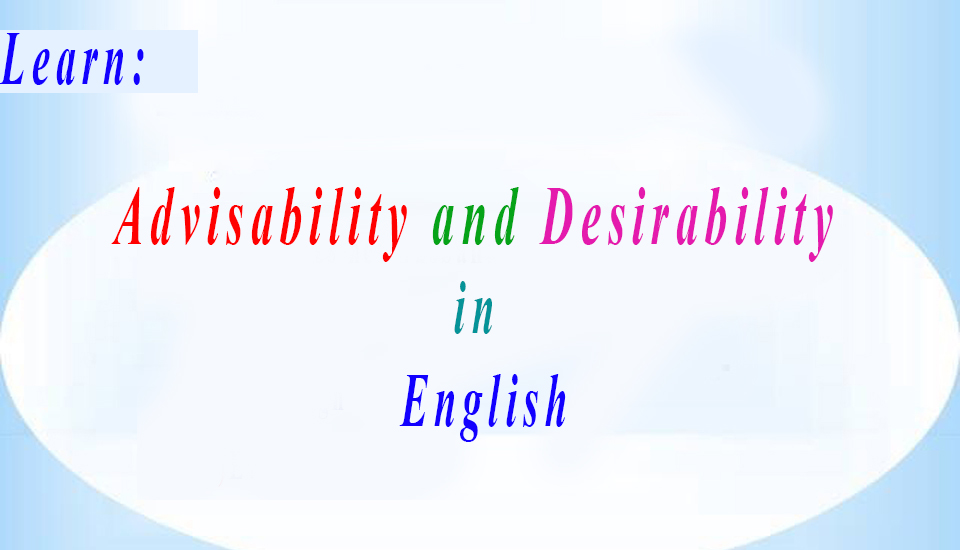There are certain modal verbs in English which are used for advisability in a particular situation. Moreover the words like “prefer, want and like” are used to express desirability. Learn about Advisability and Desirability in the lesson below.

Advisability and Desirability
1) Advisability
Advisability means something is important, necessary and advisable for someone to do it; otherwise there will be a problem or danger for. {Ought to, should, had better, must, have to} are used to express advisability.
A) Should and ought to: Should and ought to have the same meaning: they express advisability. The meaning ranges in strength from a suggestion (“This is a good idea.”) to a statement about responsibility or duty (“This is a very important thing to do.”).
- You should study harder. “This is a good idea. This is my advice.”
- You ought to study harder. “This is a good idea. This is my advice.”
- Drivers ought to obey the speed limit. “This is an important responsibility.”
- We should have protected the environment. (But we didn’t.)
- We ought to have protected the environment. (But we didn’t.)
Note: The negative contraction of should and ought to is “shouldn’t” and “oughtn’t to”.
B) Had better: Had better refers to the immediate future and is used to give strong advice (in some cases threatening advice) It is more urgent than should or ought to. The ‘had’ in had better does not behave like other auxiliary verbs. Though it appears to be past, but “had better” has a present or future meaning.
- The gas tank is almost empty. We had better stop at the next service station.
- You had better take care of that cut on your hand soon, or it will get infected.
- They had better closed the door. (But they didn’t)
Note: The negative is (had better not) and the contraction is (I’d better, you’d better, etc.) I’d better not get rest.
C) Must and have to: Must and have express stronger advisability and we can use them to express necessity and requirements. However, ‘have to’ is a semi- model and uses ‘do’ as an auxiliary verb.
- Stores must give out recyclable plastic bags.
- We have to keep clean our environment.
- She must have called her father.
- We had to stop the smoke.
Note: “Mustn’t is used to show prohibitions and don’t\ doesn’t have to express that something is not required.
- You don’t have to park on the street.
- You must not smoke here.
2) Desirability
Desire means like, wishes and wants (Prefer, like, want) are used to express desirability.
Formulas:
- Sub + prefer + noun + to + noun.
- Sub + prefer + gerund+ to + gerund.
- I prefer sandwich to hamburger for lunch.
- She prefers playing to studying.
Like: Like means to desire or to wish something; like is used to suggest something better than other things.
Formula: Sub + like + noun + ……… better than + noun.
- I like pasta better than Maggie.
- She likes Asian countries better than Western countries.
Want: Want is non-progressive verb and used to show desire, demand and wish.
Formulas:
- Sub + want + object
- Sub + want + full infinitive + Object
- Sub + want + object + full infinitive
- I want an apple.
- You don’t want to believe everything you hear.
- They want him to clean the hall.

